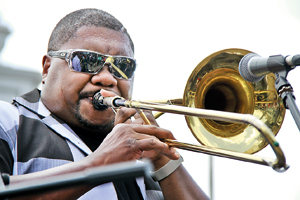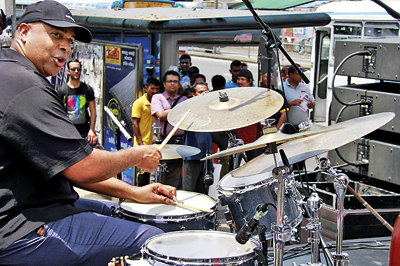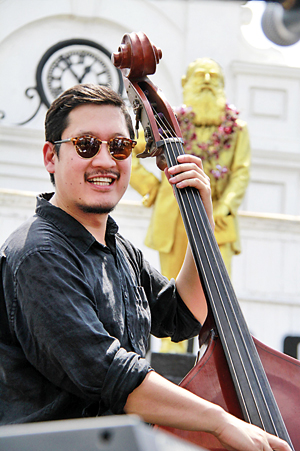The “Freedom Principle” demonstrated in Colombo
View(s):In confluence with the 70th anniversary of Ceylon’s Independence from British rule, was the marking of seven decades of diplomatic relations betwixt Washington and Colombo; that was the compelling rationale for the US State Department to arrange that the US Embassy in Colombo host the visit of trombonist Wycliffe Gordon and the International All Stars for a series of performances offered the people of Sri Lanka, completely free of charge.
 There were several performances at varied locations in metropolitan Colombo, Galle and Matara, where the band played before all sorts of people, who ranged from those that were merely curious about a band playing out there, to those who were able to recognize the inherent value in hearing and seeing a sophisticated musical exploration in improvised music, by a group of consummate professionals with authenticity behind every note they played.
There were several performances at varied locations in metropolitan Colombo, Galle and Matara, where the band played before all sorts of people, who ranged from those that were merely curious about a band playing out there, to those who were able to recognize the inherent value in hearing and seeing a sophisticated musical exploration in improvised music, by a group of consummate professionals with authenticity behind every note they played.
American author John Litweiler entitled his book which analyzed the modern musical developments in this largely American music termed ‘Jazz’, as, “The Freedom Principle”. Whatever that music is termed, this “freedom” is at the core of the fundamental immediacy and liveliness in this rather simple and at the same time complex music. Simple, because the basic outline and harmonic structure may be simply stated; the interpretation and the spontaneous interpolation, ramifications in voicing the instrumental parts, organizing of tempi and effecting changes during full flight of improvised melodic creation involve split-second musical decisions, that are risky and demanding of exceptionally fertile responses in an almost unrelenting intensity, and is therefore, complex.

Something other than a strike rocks Colombo Fort: Curious onlookers gather around (right above) as the Sextet performs in front of Fort Railway Station. Pix by Indika Handuwala
In jazz, chaos and organization remain strange bedfellows. It was a delight to be able to recognize such a ‘phenomenon’ demonstrated on two occasions in Colombo. The first evening was by the “bandstand” in the Vihara Maha Devi Municipal Park in Colombo, and the second was an open-air reception hosted by the Ambassador Atul Keshap and the US Embassy, at the Galle Face Hotel at sunset.
The Ambassador made some reference to this ‘freedom’, in his welcome remarks to the audience, and he laid claim to this music as one ‘made in America’. Be that as it may, in these past one hundred years and a bit, this music has enveloped the globe and now is the chosen vehicle of expression to communicate what lies within the human heart, mind and spirit, and has been absorbed and acquired by millions as part of a common global language. This is exemplified even within Wycliffe Gordon and His International All Stars band and its personnel. His chosen reed player, Adrian Cunningham hails from Sydney, Australia, his bassist Yasushi Nakamura comes from Japan, the drummer Dion Parson is from St. Thomas in the Virgin Islands!! Wycliffe leads, playing both trombone and trumpet (interestingly, the instrument played by Wycliffe is a trumpet fitted with a trombone mouthpiece, specially designed with a small bore to fit the trumpet), with Corey Wilcox also playing trombone, and Chris Pattishall-piano (an electric keyboard set for ‘acoustic grand piano’).
At the ‘formal’ garden party, the Sextet had to contend with a largely disengaged audience of invitees, and Gordon was at pains to introduce an especially composed Suite, which he called “70th Anniversary Suite”, which was scored in three sections or parts. The first was “The Arrival”, the second, “The Visitation”, and finally “The  Celebration – The Dance”. This work, while being scored, had much space allocated for the “Freedom Principle” where there were solo exchanges among the front line players. Cunningham acquitted himself commendably with his clarinet playing as well as with tenor saxophone. A three part vocal harmony was also in evidence in Part 1, with Adrian, Wycliffe and Corey singing the lyric which alluded to the warmth of friendship defining the 70 years of diplomatic relations. The spirit of joy was manifest, and that section led almost imperceptibly to “The Visitation” which was a slightly subdued section, scored in the manner of a spiritual and which contained some contrapuntal lines as in a fugue and then developed into an ‘orchestral’ or organ-like delineation (Remember John Lewis’ “Django”?). Finally, “The Dance” paved the way for an exuberance, with some interesting rhythmic turns in the flow of the section and a great deal more free blowing by the leads as they improvised several of the choruses. In fact, in the final coda of the piece, Wycliffe drew up mic-side and delivered an improvised lyric a tempo, which included reference to the presence of the Prime Minister of Sri Lanka among the audience!
Celebration – The Dance”. This work, while being scored, had much space allocated for the “Freedom Principle” where there were solo exchanges among the front line players. Cunningham acquitted himself commendably with his clarinet playing as well as with tenor saxophone. A three part vocal harmony was also in evidence in Part 1, with Adrian, Wycliffe and Corey singing the lyric which alluded to the warmth of friendship defining the 70 years of diplomatic relations. The spirit of joy was manifest, and that section led almost imperceptibly to “The Visitation” which was a slightly subdued section, scored in the manner of a spiritual and which contained some contrapuntal lines as in a fugue and then developed into an ‘orchestral’ or organ-like delineation (Remember John Lewis’ “Django”?). Finally, “The Dance” paved the way for an exuberance, with some interesting rhythmic turns in the flow of the section and a great deal more free blowing by the leads as they improvised several of the choruses. In fact, in the final coda of the piece, Wycliffe drew up mic-side and delivered an improvised lyric a tempo, which included reference to the presence of the Prime Minister of Sri Lanka among the audience!
It would have been wonderful if people present appreciated the effort made by these visiting musicians to lend value to the occasion. Whatever the seedier elements may have been at the time of ‘jazz’ being born in the bordellos of the American south, and it developed into the mainstream of entertainment in Chicago’s speakeasies in the 1930s, this most vital of musical forms is now firmly in the realm of high-art and its vitality, and heard in the concert halls of the globe and even in designated clubs.
The Sextet generally carry the fire and frolic associated with the post-hard bop period of this music; but it must be said that Wycliffe reaches all the way back in his musical consciousness, and even evokes elements of New Orleans, if that was what the moment urged him to do.
The concert in the park was a very mainstream set. “In a Mellowtone” (Ellington); “Stablemates” (Benny Golson); “When You’re Smiling” (with vocals shared by Wycliffe and Adrian Cunnigham); Blue n Boogie (Dizzy Gillespie), C- Jam Blues (Ellington) and “Mercy, Mercy, Mercy” (Cannonball Adderly)
I wonder how the modest crowd savoured the experience. I remain wondering how it all went down.
Arun Dias Bandaranaike


